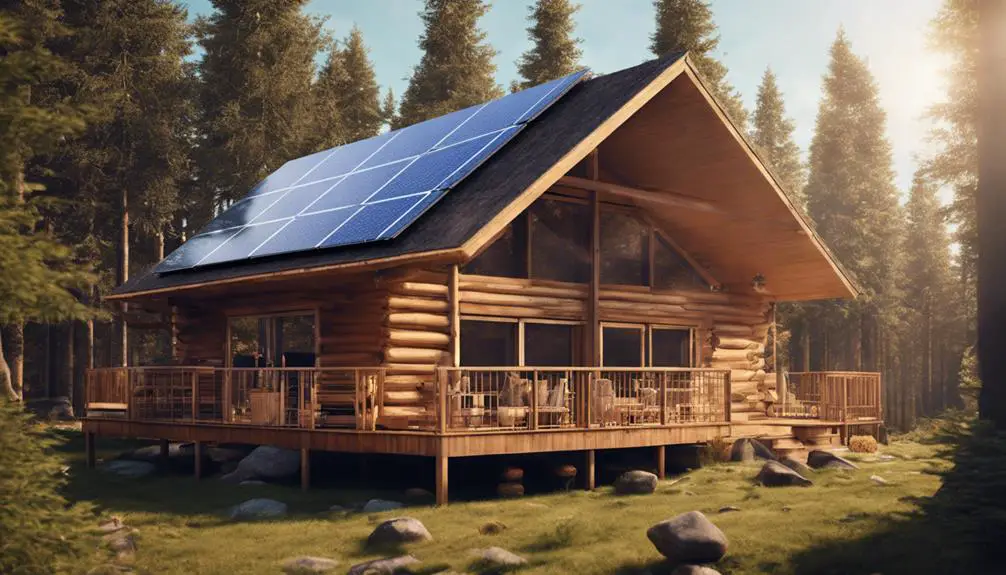Calculate your cabin's total daily energy consumption to determine the number of solar panels needed. List your electrical devices and their power ratings for accurate calculations. Consider optimal panel placement ensuring ample sunlight exposure. Factor in your budget limitations for a balanced system. Evaluate solar panel efficiency, orientation, and potential shading. Analyze sunlight exposure duration and intensity specific to your cabin's location. Assess battery storage capacity aligned with your energy needs for continuous power supply. Consulting with solar experts can provide precise evaluation. Make informed decisions tailored to your cabin's unique energy requirements for a successful off-grid power solution.
Determining Your Cabin's Energy Needs
To determine the energy needs of your cabin, calculate the total power consumption of all electrical appliances and devices used regularly. Start by conducting an energy consumption analysis to identify the power usage patterns of your cabin. Consider off-grid alternatives and sustainable energy sources to optimize your electricity requirements.
Perform a detailed power usage assessment by listing all appliances and devices along with their power ratings in watts. Group them based on usage frequency to prioritize energy consumption. Identify high-energy consumers like refrigerators, heaters, or air conditioners, which significantly impact your overall power requirements.
Explore sustainable energy sources such as solar panels, wind turbines, or hydroelectric systems to supplement or replace traditional grid connections. Assess the feasibility of each option based on your location, budget, and environmental considerations.
Calculating Solar Panel Requirements
When determining the solar panel requirements for your cabin, begin by calculating the total daily energy consumption in watt-hours. This involves listing all the electrical devices you plan to use, their power ratings in watts, and the average daily usage time in hours.
Summing up the energy consumption of each device will give you an estimate of your daily energy needs. Once you have this figure, consider panel placement to maximize sunlight exposure.
Factor in budget constraints when deciding on the system size. A larger system with more panels can generate more electricity but may exceed your budget. Conversely, a smaller system may be more affordable initially but could limit the amount of power generated.
Balancing energy consumption, panel placement, budget constraints, and system size is crucial to ensure your solar panel setup meets your cabin's needs efficiently and effectively.
Considering Solar Panel Efficiency
Evaluate the efficiency ratings of different solar panels to determine which ones will best meet your cabin's energy needs. When selecting solar panels for your cabin, consider the panel orientation and shading. Panels should be installed facing south for optimal sunlight exposure, avoiding any shading from nearby trees or structures.
Seasonal variations should also be taken into account, as sunlight intensity changes throughout the year. Some panels may perform better in low-light conditions or extreme temperatures, so choose panels that suit your cabin's location and climate.
Additionally, factor in maintenance costs when evaluating solar panel efficiency. Higher efficiency panels may come with increased initial costs but could save you money in the long run by generating more electricity over their lifespan. Consider the warranty and expected maintenance requirements of different panels to make an informed decision.
Evaluating Sunlight Conditions
Consider analyzing the duration and intensity of sunlight exposure in the location where you plan to install solar panels for your cabin. Conduct a thorough sunlight analysis to determine the optimal placement of your panels.
Assess potential obstructions like trees, buildings, or other structures that could cast shadows on the panels during the day. Utilize shading assessment tools or consult with a solar expert to accurately evaluate how shading may impact the efficiency of your solar system.
Factoring in Battery Storage Capacity
Assessing the battery storage capacity is a vital step in ensuring the efficiency and reliability of your solar panel system for the cabin. When considering off-grid living and sustainability, it's crucial to select batteries that align with your energy needs while factoring in battery lifespan and maintenance requirements.
Opting for deep-cycle batteries designed for renewable energy systems can enhance the overall performance and longevity of your off-grid solar setup. These batteries are specifically built to withstand regular charging and discharging cycles, making them ideal for remote cabins.
Proper maintenance of your batteries is essential to maximize their lifespan. Regularly monitoring the battery levels, ensuring proper ventilation, and keeping the batteries clean from dirt and corrosion are key practices to uphold. Additionally, understanding the depth of discharge that your batteries can safely undergo without compromising their longevity is fundamental.
Consulting With Solar Experts
Engage with solar experts to gain valuable insights and guidance on optimizing your cabin's solar panel system. When consulting with professionals in the field, you can benefit from their expertise in various aspects such as budget considerations, the installation process, off-grid living requirements, and the environmental impact of your system.
Solar experts can help you assess your budget and recommend the most cost-effective solar panel options for your cabin. They can provide detailed insights into the installation process, ensuring that your panels are positioned correctly for optimal energy absorption.
Additionally, experts can advise on the best practices for off-grid living, including battery storage capacity and energy management strategies tailored to your specific needs.
Moreover, consulting with solar experts allows you to understand the environmental impact of your solar panel system. They can guide you on selecting eco-friendly components and designing a system that minimizes your cabin's carbon footprint.
Conclusion
In conclusion, calculating the number of solar panels needed for your cabin requires careful consideration of several factors:
- Energy needs
- Panel efficiency
- Sunlight conditions
- Battery storage capacity
Have you taken all these factors into account to ensure your off-grid power system will meet your requirements? Consult with solar experts to help you design a system that will provide reliable and sustainable energy for your cabin.
